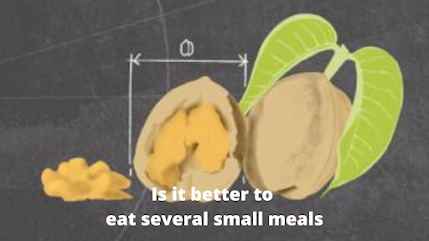A significant number of us might have heard that eating a few little dinners every day can assist with further developing digestion and accomplishing ideal wellbeing. Notwithstanding, proof to help this guarantee is blended. In this Honest Nutrition highlight, we take a top to bottom glance at the ebb and flow research behind dinner recurrence and examine the advantages of little regular feasts contrasted and less, bigger ones.
Broadly acknowledged in present-day culture individuals ought to separate their day-to-day diet into three enormous feasts — breakfast, lunch, and supper — for ideal wellbeing. This conviction fundamentally comes from culture and early epidemiological studiesTrusted Source.
As of late, notwithstanding, specialists have started to alter their point of view, proposing that eating more modest, more continuous dinners might be best for forestalling constant illness and weight reduction. Subsequently, more individuals are changing their eating designs for eating a few little feasts over the course of the day.
The people who advocate for eating little, regular dinners recommend that this eating example can:
further, develop satiety, or feeling full after a dinner
increment digestion and a body piece
forestall dunks in energy
settle glucose
forestall indulging.
While a couple of studies support these proposals, others show no critical advantage. As a matter of fact, some exploration proposes it very well might be more gainful to stay with three bigger feasts.
Meal frequency and chronic disease
Early epidemiological studiesTrusted Source recommends that expanded feast recurrence can further develop blood lipid (fats) levels and diminish the gamble of coronary illness. Thus, numerous specialists exhort against eating less, bigger dinners daily.
Throughout the long term, a few examinations have upheld these discoveries, recommending that individuals who report eating little, continuous dinners have preferred cholesterol levels over the people who consume less than three feasts each day.
Specifically, one 2019 cross-sectional study trusted Source that looked at eating less than three feasts each day or multiple dinners each day found that consuming multiple dinners builds HDL (high-thickness lipoprotein) cholesterol and brings down fasting fatty substances all the more successfully. More elevated levels of HDL are related to a diminished gamble of coronary illness.
This study noticed no distinctions in all-out cholesterol or LDL (low-thickness lipoprotein) cholesterol. It is critical to note, nonetheless, that this is an observational review, meaning it can demonstrate affiliation, not causation.
Moreover, one survey distributed in the American Heart Association's diary CirculationTrusted Source reasoned that more prominent eating recurrence is related to a decreased gamble for diabetes and cardiovascular sickness, as per epidemiological examinations.
Meal frequency and weight loss
There is a regularly held thought that more continuous dinners can assist with impacting weight reduction. Notwithstanding, the examination on this stays blended.
For instance, one study trusted Source thought about eating three dinners each day or six more modest, more successive feasts on muscle versus fat and saw hunger. The two gatherings got satisfactory calories to keep up with their ongoing body weight utilizing the equivalent macronutrient circulation: 30% of energy from fat, 55% starch, and 15% protein.
Toward the finish of the review, analysts noticed no distinction in energy use and muscle versus fat misfortune between the two gatherings. Strangely, the people who consumed six more modest dinners over the course of the day had expanded hunger levels and wanted to eat contrasted with the individuals who ate three bigger feasts each day.
In spite of the fact that calorie admission was controlled in the two gatherings, analysts estimated that the people who consumed regular feasts would be bound to consume more day-to-day calories than the individuals who ate less much of the time.


.jpg)

Comments
Post a Comment